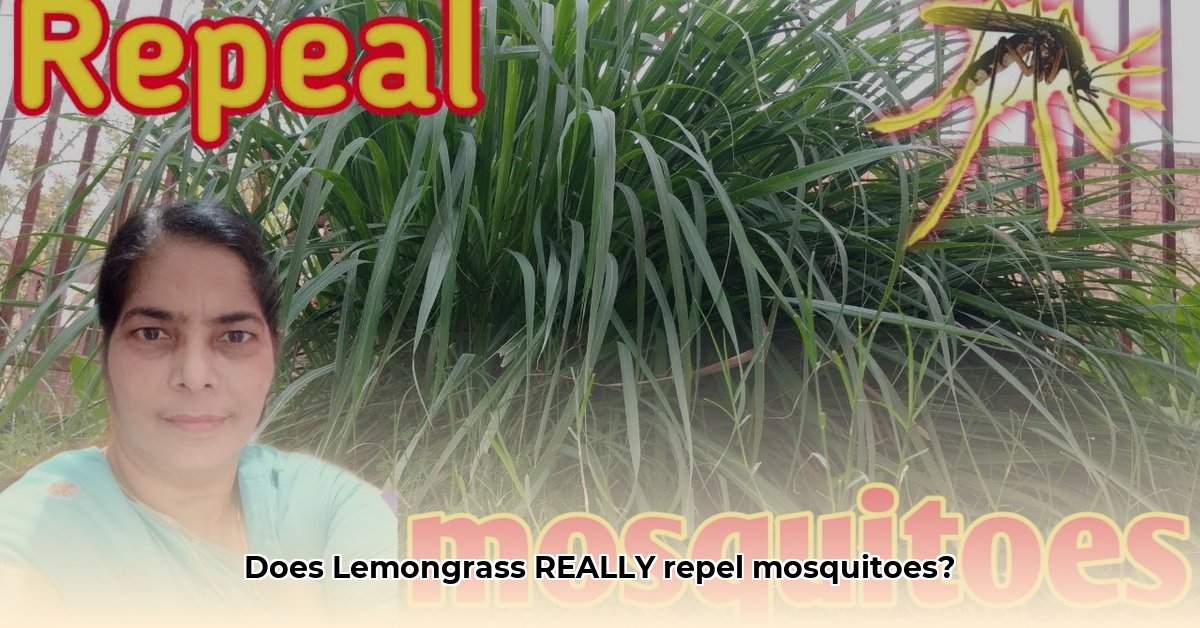Mosquitoes buzzing around your head? Looking for a natural way to keep them at bay? Lemongrass might be your answer. While not a foolproof solution, it can be a valuable tool in your mosquito-fighting arsenal. This guide explores the science behind lemongrass as a repellent and provides practical tips for using it effectively.
Understanding Lemongrass and Mosquitoes
Lemongrass contains compounds, most notably citral, that likely interfere with a mosquito’s sense of smell, making it harder for them to locate you. Think of it as masking your scent and disrupting their “radar.” This isn’t just folklore; studies suggest lemongrass oil can repel mosquitoes, possibly offering a few hours of protection, particularly against species like Aedes aegypti. However, ongoing research continues to explore the complexities of this interaction.
Using Lemongrass: A Step-by-Step Guide
How you use lemongrass significantly impacts its effectiveness. Here’s a breakdown of the most common methods, ranked from most to least effective:
1. Topical Application of Lemongrass Essential Oil
This direct method likely provides the best protection. Important: Never apply undiluted essential oil to your skin, as it can cause irritation.
- Choose a carrier oil: Coconut, jojoba, or almond oil are good choices.
- Dilute: Start with a low concentration (1-3% lemongrass oil to carrier oil). For example, mix 1-3 drops of lemongrass oil with 100 drops of carrier oil. Gradually increase if needed, but always perform a patch test first.
- Patch test: Apply a small amount to your inner forearm and wait 24 hours to check for any reactions.
- Apply: Apply the diluted oil to exposed skin. Reapply every 2-4 hours, or as needed.
2. DIY Lemongrass Repellent Spray
This is a convenient way to apply diluted lemongrass oil.
- Mix: Combine diluted lemongrass oil (using the same dilution as topical application) with water or witch hazel in a spray bottle.
- Enhance (optional): Add other repellent essential oils like citronella or eucalyptus.
- Apply: Shake well and spray on skin and clothing. Reapply as needed.
3. Diffusers, Candles, and Incense
These create a pleasant aroma and may offer some repellency, especially in enclosed areas. However, they are less effective than direct application because the concentration of diffused oil is typically lower.
- Use as directed: Follow manufacturer instructions for diffusers, candles, and incense.
- Ventilation: Ensure good ventilation to avoid respiratory irritation.
- Safety: Never leave burning candles or incense unattended.
4. Planting Lemongrass
While adding beauty and fragrance to your garden, this is the least effective repellent method. The concentration of released compounds is generally too low for significant mosquito deterrence.
Safety Precautions and Considerations
While generally safe, lemongrass oil requires careful use:
- Dilution is Key: Always dilute essential oil before topical application to avoid skin irritation.
- Patch Test: Perform a patch test before widespread use.
- Children and Pets: Exercise extreme caution. Avoid applying to their skin. Consult a pediatrician or veterinarian before use. Keep all lemongrass products out of their reach.
- Pregnancy/Breastfeeding: Consult your doctor before using lemongrass oil.
- Eye and Mouth Contact: Avoid contact with eyes and mouth. If contact occurs, rinse thoroughly with water.
Lemongrass vs. Other Repellents
Lemongrass can be an effective natural alternative, but it’s generally not as potent or long-lasting as synthetic repellents like DEET.
| Repellent | Effectiveness | Duration | Precautions |
|---|---|---|---|
| Lemongrass Oil | Moderate-High | 2-4 hours | Dilute; patch test; caution with children and pets |
| Lemongrass Spray | Moderate | 2-4 hours | Reapply frequently; patch test |
| DEET | High | Several hours | Follow product instructions; caution with children and pets |
Combining Strategies for Optimal Protection
For the best mosquito defense, combine lemongrass with other strategies:
- Eliminate Standing Water: Remove mosquito breeding grounds.
- Physical Barriers: Use mosquito nets, screens, and clothing.
- Other Repellents: Consider other natural repellents like citronella, eucalyptus, or peppermint.
By understanding the science behind lemongrass and using it safely and effectively, you can make it a helpful part of your natural mosquito control plan. Remember, research is ongoing, so keep exploring the latest findings for the most up-to-date information.
- Dora the Explorer Wipe-Off Fun: Safe & Mess-Free Activities for Little Explorers - April 18, 2025
- Does Lemongrass Repel Mosquitoes? Fact vs. Fiction + How to Use It - April 18, 2025
- Do Woodchucks Climb Trees?Fact vs. Fiction - April 18, 2025










